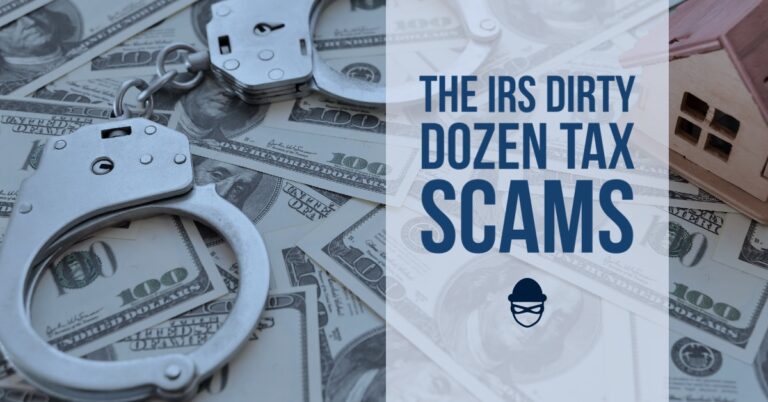It’s tax season, when folks are digging through receipts, making spreadsheets and filling out IRS forms. The filing deadline for federal taxes is Monday, April 18.
If you’re overwhelmed at the task of organizing your returns, you might start daydreaming about filing late—or not filing at all. Will the IRS even notice that you didn’t file your taxes?
The answer is yes.
Both filing late or ignoring the tax deadline altogether bring serious consequences.
The Legit Way to Delay Your Tax Return
If you’re getting that uneasy feeling that you’ll be unable to to file your tax return on time, you have an easy and legal option: File for an extension.
You have until April 18 to file an extension with form 4868. This automatically gives you a 6-month extension to October 15. This is a smart move if you know you need more time to get organized.
Filing an extension also applies to state taxes; each state has its own policies. Contact your state tax authority to file an extension. If you have an approved federal extension or do not expect to owe additional tax, you may not need to file a state extension.
For Missouri, you may need to file Form MO-7004.
Special Circumstances
Note that you may be eligible for an automatic extension if you’re currently living outside the U.S. or serving in the military.
The IRS also offers extensions to people affected by natural disasters.
Failing to File vs. Failing to Pay
In general, the IRS can be forgiving about failing to file as long as you pay.
You’ll get hit with more severe penalties if you fail to pay your taxes than if you fail to file. If you’re in financial difficulty, the IRS will usually work with you to pay your tax bill; you can often develop a payment plan.
So if you’re not sure you can pay, it is still the best move to file your taxes and find a solution with the IRS later.
So You Filed Your Taxes Late… Now What?
Life happens. What happens when you’re ready to file your taxes, and it’s way after the deadline?
File your return, no matter how late. This can avoid failure-to-file penalties and clear you of any suspicion that you’re attempting criminal tax evasion, because at least you’re acknowledging your tax debt.
The Good News: The IRS May Waive Late Filing Penalties
If you’re getting a refund on your taxes, the IRS usually won’t penalize you for a late return because you’ll just be late getting your money back. However, you have to file a return within three years to get your refund. After that, you forfeit any refunds that the government owes you.
Also, the IRS can be reasonable when it comes to failure to file or pay. If you submit a sensible explanation for your lateness in writing, the IRS may waive the penalties. Just call the number on the IRS notice about your failure to pay, and you’ll find out how to move forward with your explanation letter.
The Bad News: Interest & Penalties
Since your return is late, so is your payment. The IRS will charge you interest on unpaid balances and will also hit you with some penalties.
How does this work?
- Interest starts accruing from the due date (April 18) until you pay your balance.
- For anyone who isn’t a corporation, the interest rate is 3%.
- You’ll be charged a late payment penalty, which starts at 0.5% of your tax bill per month, with an upper limit of 25% (on top of the tax you owe and the interest charged on that).
- If you negotiate an installment plan, the penalty rate is cut in half to 0.25%.
The Ugly News: Garnished Wages, Increased Penalties
Eventually, the IRS will issue a notice that it intends to seize property to satisfy the bill. Ten days after that, the penalty rate increases to 1%.
If you filed for an extension and missed that deadline, the penalty jumps to 5%.
Eventually, the IRS will also likely garnish your wages to pay off your tax bill. This means that the IRS will take the money you owe directly out of your paycheck before it reaches you.
The IRS will get the money you owe—and potentially a lot more of your money through interest and penalties.
There’s no benefit to filing late. Your best move is to file and figure out the payment later.
What Happens If You Don’t File Taxes…Ever
Criminal charges
If you don’t pay the taxes you owe, it’s called tax evasion, and it’s illegal.
- In the last three years, there have been almost 5,000 investigations of tax crimes in the US.
- Tax fraud conviction might cost you up to $100,000 and jail time.
- The IRS has a six-year period to charge you; after that you’re legally in the clear.
- The IRS can collect the taxes you owe and impose penalties on you forever, no matter its decision on criminal charges.
Interest and Penalties
The IRS will penalizing you the day your taxes are due.
- The failure-to-file penalty will be charged unless you’ve submitted a reasonable explanation for your lack of a return.
- The failure-to-pay starts off at 0.5% of your tax bill, and maxes out at 25%. This is in addition to the failure-to-file charges.
- The IRS can seize property, garnish wages, and place liens on your home in their pursuit of your money.
Impact on Your Credit
Since tax liens don’t appear on credit reports, so there’s no direct impact on your credit score if you don’t pay your taxes. However, a credit search also usually includes public records, and if there’s liens from the federal government, your eligibility for loans and other financial activities will be impacted.
The IRS May File Your Taxes for You
The IRS can file on your behalf using whatever information they have. If you’ve worked a job, your W-2 forms are supplied to the IRS, so the IRS knows how much you earned. If you ignore your taxes, you may get a letter from the IRS informing your return is filed and that you owe a certain amount. This will usually be a higher tax bill because you won’t have credits, deductions, or other tax breaks applied.
So don’t put your head in the sand when it comes to taxes. Take some action—whether it is filing an extension or hiring an accountant to help you—so you can avoid a tax nightmare.
More Information
If you have questions, contact us to discuss your situation.
To check out our other articles on business topics, click here.
Smith Patrick CPAs
Smith Patrick CPAs is a growing firm based in St. Louis, MO. From accounting to wealth management, our team takes a consultative approach. We provide excellent, personal service to small businesses and financially active individuals. It’s our goal to help you to make the best decisions, saving you money and headaches.
About Smith Patrick CPAs
Smith Patrick CPAs is a boutique, St. Louis-based, CPA firm dedicated to providing personal guidance on taxes, investment advice and financial service to forward-thinking businesses and financially active individuals. For over 30 years, our firm has focused on providing excellent service to business owners and high-net worth families across the country. Investment Advisory Services are offered through Wealth Management, LLC, a Registered Investment Advisor.





